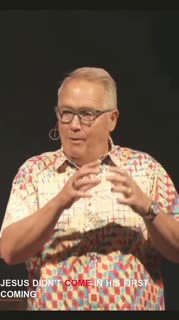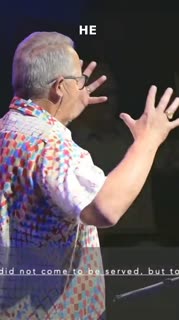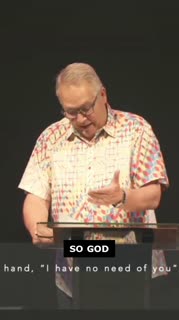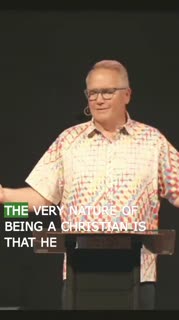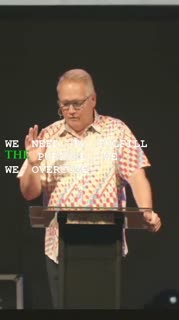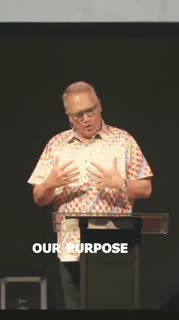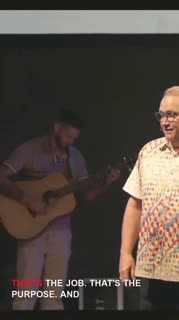Embracing Humility: The True Path to Greatness
Devotional
Sermon Summary
Bible Study Guide
Sermon Clips
1) "It's the upside-down kingdom. We're in the upside-down kingdom. It's the opposite of the way the world works. So, sometimes it's hard, because the world is always pushing its agenda. Sometimes it's hard for us to see God's agenda, and how God works differently than the kingdoms of the world. So, Matthew chapter 18, 1. At that time, the disciples came to Jesus and said, who then is greatest in the kingdom of heaven? Which is to say, which one of us, is the best? I mean, think about it. This is a crazy question. I mean, that you would go and ask Jesus, which one of us, okay, Jesus, if you got to pick, and you got to pick, we're saying pick, which one of us is the greatest in the kingdom of heaven?" [41:59] (51 seconds)
2) "Jesus didn't come in his first coming for a political kingdom, but for a spiritual kingdom, so that he could do the work of redeeming all of history, and bringing all of us into his family. So, so they already have a, they have a preconceived idea of how it should be. So, they missed it. All of the prognosticators about how the first coming was going to manifest itself, they missed it. Guess what? When Jesus comes again, how many of you think the charts that they've all made are going to be right?" [43:18] (41 seconds)
3) "Jesus is saying, he said, my kingdom is just different. My kingdom is not built like the Gentile kingdom. It's not about power and control. It's about serving and laying down your life and laying down your life. It's about laying down power and control. And you would think that that's so interesting. He said, it's just an upside down kingdom. So now we get up, you know, and to the last supper and they've just, Jesus has just shared communion with them. He just told them, this is my body. This is my blood. Would you shed for you?" [53:57] (35 seconds)
4) "So God has placed people in the body. I believe, I believe that God calls people into the body of Christ. And that he sets us in bodies. And I think even in, I think he even operates within a local, like our local body that you're, I think he calls you. I was called into this body 43 years ago by the work of the Lord. And then I think God calls people into the body and he does it, does it different ways." [58:34] (32 seconds)
5) "The very nature of being a Christian is that he calls us to be in his body, his church, the Ecclesiastical The Ecclesiastical church. Yeah. The called out ones. That's where his church, we're the called out. We've been called out of darkness into light. Very nature. There's, there's something that's happened and we've been called into his family and into relationship. And so he uses this term body in church saying, I don't need to go to church to be a Christian is like saying, I don't need a wife to be married or a husband to be married. So God is going to place us in his body as he desires." [01:03:56] (45 seconds)
6) "We need to fulfill the purpose. We, we overcome the pull of the world to selfishness, independence. When we understand that. We understand that God's pulled us into his purpose. God has called us to his purpose. He's building the church. He's building his body. We're in the church. It's not a building. It's not a place. It's us. It's, it's the people of God gathered together under the name of the Lord, Jesus Christ to fulfill his purpose." [01:11:18] (30 seconds)
7) "Our purpose is to do what Jesus told us to do. I mean, he's our commander in chief. He's. He's our Lord and savior. He's the king of Kings and Lord of Lords. What did he tell us to do? Mark 16, 15. He said, go into all the world and preach the gospel to all creation. So what's our purpose? Go into all the world and preach the gospel to all creation. Our, our job is to tell as many people as we possibly can about the saving grace of the Lord, Jesus Christ, that Jesus came and died for the sins and rose again so that we could walk in that victory." [01:11:49] (35 seconds)
8) "That's the job. That's the purpose. And so one the things is if you're not serving, you need to be serving somewhere. And if you're not serving because you think just doing mundane task is not important, like greeting the door or passing out donuts or working with kids, you think if it's beneath you, that's the problem. That's a selfishness problem. That's a, I'm more important. I'm, I'm the greatest in the kingdom. I'm the greatest. You're like the Muhammad Ali of church people. The Lord's called us. We've got purpose. We've got a reason. There are lost people that need Jesus all around every one of us, all around of us." [01:14:04] (58 seconds)
Ask a question about this sermon
2) "Jesus didn't come in his first coming for a political kingdom, but for a spiritual kingdom, so that he could do the work of redeeming all of history, and bringing all of us into his family. So, so they already have a, they have a preconceived idea of how it should be. So, they missed it. All of the prognosticators about how the first coming was going to manifest itself, they missed it. Guess what? When Jesus comes again, how many of you think the charts that they've all made are going to be right?" [43:18] (41 seconds)
3) "Jesus is saying, he said, my kingdom is just different. My kingdom is not built like the Gentile kingdom. It's not about power and control. It's about serving and laying down your life and laying down your life. It's about laying down power and control. And you would think that that's so interesting. He said, it's just an upside down kingdom. So now we get up, you know, and to the last supper and they've just, Jesus has just shared communion with them. He just told them, this is my body. This is my blood. Would you shed for you?" [53:57] (35 seconds)
4) "So God has placed people in the body. I believe, I believe that God calls people into the body of Christ. And that he sets us in bodies. And I think even in, I think he even operates within a local, like our local body that you're, I think he calls you. I was called into this body 43 years ago by the work of the Lord. And then I think God calls people into the body and he does it, does it different ways." [58:34] (32 seconds)
5) "The very nature of being a Christian is that he calls us to be in his body, his church, the Ecclesiastical The Ecclesiastical church. Yeah. The called out ones. That's where his church, we're the called out. We've been called out of darkness into light. Very nature. There's, there's something that's happened and we've been called into his family and into relationship. And so he uses this term body in church saying, I don't need to go to church to be a Christian is like saying, I don't need a wife to be married or a husband to be married. So God is going to place us in his body as he desires." [01:03:56] (45 seconds)
6) "We need to fulfill the purpose. We, we overcome the pull of the world to selfishness, independence. When we understand that. We understand that God's pulled us into his purpose. God has called us to his purpose. He's building the church. He's building his body. We're in the church. It's not a building. It's not a place. It's us. It's, it's the people of God gathered together under the name of the Lord, Jesus Christ to fulfill his purpose." [01:11:18] (30 seconds)
7) "Our purpose is to do what Jesus told us to do. I mean, he's our commander in chief. He's. He's our Lord and savior. He's the king of Kings and Lord of Lords. What did he tell us to do? Mark 16, 15. He said, go into all the world and preach the gospel to all creation. So what's our purpose? Go into all the world and preach the gospel to all creation. Our, our job is to tell as many people as we possibly can about the saving grace of the Lord, Jesus Christ, that Jesus came and died for the sins and rose again so that we could walk in that victory." [01:11:49] (35 seconds)
8) "That's the job. That's the purpose. And so one the things is if you're not serving, you need to be serving somewhere. And if you're not serving because you think just doing mundane task is not important, like greeting the door or passing out donuts or working with kids, you think if it's beneath you, that's the problem. That's a selfishness problem. That's a, I'm more important. I'm, I'm the greatest in the kingdom. I'm the greatest. You're like the Muhammad Ali of church people. The Lord's called us. We've got purpose. We've got a reason. There are lost people that need Jesus all around every one of us, all around of us." [01:14:04] (58 seconds)

